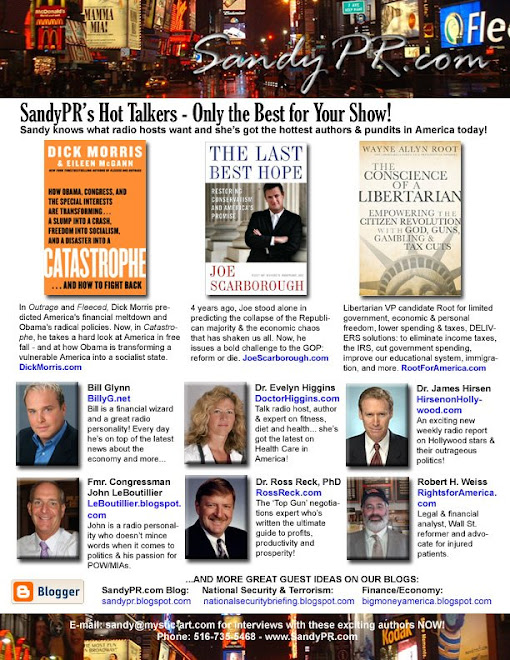Thursday, July 14, 2016
Tuesday, July 12, 2016
FAILURE By Vicki E. Alger
New Book Gives U.S. Department of Education a Failing Grade
Education, being one of the top issues debated by the presidential candidates, is very much on the minds of all Americans. Trump advocates for school choice, refers to common core as a "disaster," and is calling for an end to the Department of Education. Clinton wants to socialize students and believes that it takes a village to raise a kid. In an important new book, education reform expert Vicki E. Alger, Ph.D., author of FAILURE: The Federal Misedukation of America's Children, shows us what the problems are and offers sound strategies toward improving on the failures of America's educational system.
In FAILURE, you'll learn that for nearly 100 years the federal government left education almost entirely in the hands of state and local governments. Gradually, however, federal restraint gave way, culminating in 1979 with the creation of the U.S. Department of Education - a sprawling bureaucracy with more than 4,000 employees, 100 programs, and an annual budget of approximately $70 billion. What caused this dramatic transformation? Has it improved student performance? And how can we best ensure that America's schoolchildren will get the education they need for thriving in an increasingly technological, competitive global economy?
When President Jimmy Carter established the U.S. Department of Education (ED) in 1979 as the thirteenth cabinet-level agency, the advocates of a larger role for the federal government in education hailed it as a hard-won victory for America's taxpayers, educators and school children. But thirty-six years later, ED has yet to live up to the promises, which tells us:
- It has failed to act as a genuine partner to state and local governments, but instead lords over them. Strings attached to federal funding have created an ongoing tug-of-war between the feds and the states.
- It has failed to ensure that federal dollars are spent efficiently. Programs remain spread across multiple departments, perpetuating redundancy and waste of taxpayer dollars.
- It has failed to appreciably improve student academic performance. International assessments reveal that 17-year-olds as a group are only slightly better in math than they were in 1978, and their reading ability has remained flat since 1971.
- ED has failed to reach every meaningful goal its advocates had promised.
After providing a history and assessment of federal involvement of education (including a comparison with top-performing education systems worldwide), FAILURE offers a way forward. Dr. Alger's steps include:
- Immediately eliminating 19 non-program offices and divisions within the Department of Education, and returning the $14 billion in savings to taxpayers via a tax credit;
- Letting the American people work with local lawmakers and educators to set priorities that meet the specific needs of students in their communities;
- Empowering citizens to create parental choice programs in the states - including tuition tax credits and educational savings accounts; and
- Abolishing ED and returning the federal government to its constitutional role in education (none).
Federal involvement in education, FAILURE shows, has been an epic failure - a failure of ineffective educational programs, a failure with massive wasteful spending, and a failure of the Department of Education to be a partner with state and local governments. Fortunately, Dr. Alger's rigorous assessment enables her to identify and articulate the best strategy for success - namely, decentralizing education policy by ending federal involvement, returning power to state and local governments, and implementing parental choice. [more...]
ABOUT THE AUTHOR: Vicki E. Alger, Ph.D., is Research Fellow at the Independent Institute and the author of more than forty education policy studies. She has provided expert affidavits for the successful legal defense of educational choice programs for low-income, foster-care and disabled children. Her work was also used in the successful legal defense of tax-credit scholarship programs in the U.S. Supreme Court.
Ronald Reagan Teaches from The Past
With the presidential election heating up daily and the
media, the GOP and Republican Nominee, Donald Trump constantly making
references to President Reagan's much-admired accomplishments, comes a very
unique book about our 40th President. Heralded by Hon. George P. Shultz,
Secretary of State under President Reagan and renowned Reagan historians alike,
Reagan's 1968
Dress Rehearsal: Ike, RFK, and Reagan's Emergence as a World Statesman
is an inspiring never-before-told history of how Ronald Reagan began to restore
pride in America when he first ran for president in the late 1960s.
Author and historian, Gene Kopelson's
tireless research uncovered findings based upon never-before-analyzed critical
archives. He reveals may lessons President Reagan can teach us today that
mirror the past.
America is torn by racial strife, as blacks
riot in the cities. A Democrat president is mismanaging a war in Asia, as he
refuses to let American forces win the war. A Democratic leader sides with the
law breakers and says that blacks do not have to obey the law. Is this 2016?
No, it's the mid-1960s, and the only candidate running for the presidency who
wants the rule of law to be paramount and to apply equally to all American
citizens is the Republican candidate running for president for the first time:
Ronald Reagan.
As part of a secret Kennedy-organized plan
to harass conservative political enemies, RFK arranges for the IRS to audit ten
years of Ronald Reagan's taxes. Then RFK pressures CBS to cancel Reagan's TV
show. Faced with no income, Ronald Reagan decides to enter politics but needs
the advice of a highly-respected senior political elder of the same
conservative philosophy.
Reagan turns to former President Dwight
Eisenhower, and this begins a never-before-described multi-year political
mentorship and friendship that changed American and world history. Eisenhower
guided Reagan to win the governorship of California and then, as Reagan first
sought the presidency in 1967-68, Ike mentored Reagan on world affairs. Indeed,
future President Ronald Reagan's successes in no small part depended upon his
fulfillment of Ike's policies, whose effects are very much with us today.
A steadfast and principled conservative is
running for president for the first time. He is an accomplished speaker who
electrifies his audiences but is opposed by the GOP's establishment. Yet the
grassroots American public loves him. Is this 2016? No, it's 1968 and Ronald
Reagan is generating huge enthusiasm across the country as he tries to win the
nomination from establishment-favorite Richard Nixon.
Early in the 20th century, Republican
President Theodore Roosevelt first called for Americans never to be divided
into subgroups; he wanted all citizens to be called Americans first. Yet
Democrats call for division: they call Americans by hyphenated subgroups to
promote discord: Black Americans, Mexican Americans, etc. In the mid and late
1960s, Roosevelt's call was continued by Republican Ronald Reagan on his first
quest for the presidency and by his hidden political mentor, Republican and
former president, Dwight Eisenhower. They saw through the Democrats' plan for
divisiveness in order to claim grievances and garner votes.
Both Reagan and Eisenhower called for all
citizens to see themselves as Americans first and to identify with the pride
and goodness of their country. During Reagan's first campaign for the
presidency in 1966-1968, and in the correspondence between Reagan and Ike, this
theme of discarding the Democrats' "hyphenated Americans" was a
critical theme for the unity of all Americans.
ABOUT THE AUTHOR: Gene Kopelson is president of the New England chapter, and on the
Board of Trustees, of the Theodore Roosevelt Association, an active
Churchillian, and a holocaust educator. As an historian, he has published works
on Theodore Roosevelt's Great White Fleet, Ronald Reagan's 1966 campaign and
Mexican American voters, the 1968 Nebraska and Oregon Republican primaries, and
Washington State Republican politics in the 1960s. His research on Reagan and
Eisenhower was featured in 2015 at the 125th Commemoration of the Birth of
Dwight Eisenhower at the Dwight D. Eisenhower Presidential Library.
Kopelson is a popular speaker and frequent guest on talk radio.
Subscribe to:
Posts (Atom)






